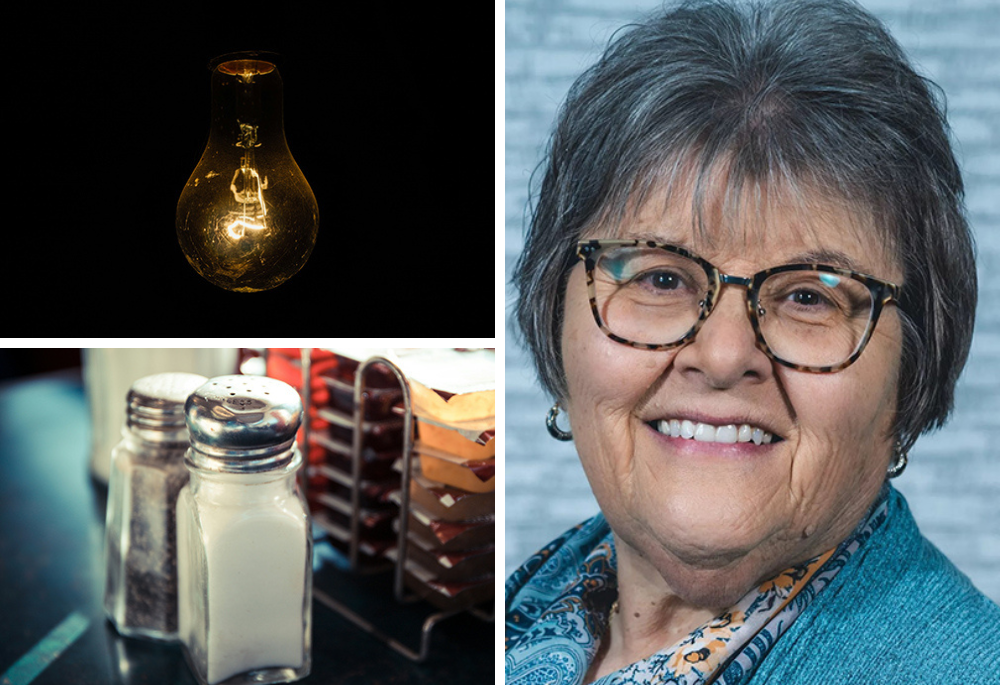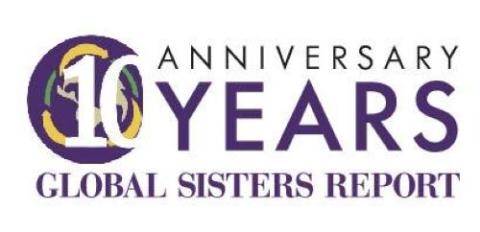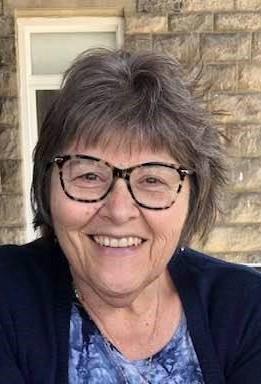
Sr. Judy Zielinski is pictured in a composite image. She tells GSR that she has "a little postcard on my refrigerator that says at the top 'Be these,' and it's a picture of a lightbulb and a salt shaker." (Unsplash/Rodion Kutsaiev, top, Peter Workman, bottom; photo courtesy of Judy Zielinski)
Editor’s note: Global Sisters Report, the dynamic online community that reports on and gives voice to Catholic women religious around the world, is celebrating its 10th anniversary this year. Join us as we take another look at stories and columns published in 2014 with new updates and reporting.
Sr. Judy Zielinski, a Sister of St. Francis of Sylvania, Ohio, has built a life telling stories. Her work in communications has taken her across the country, from Family Theater Productions in Hollywood to the Conference of Major Superiors of Men in Washington to NewGroup Media in South Bend, Indiana, where she currently serves as director of faith and values programming.

Among her many broadcast credits, she is the writer and producer of several acclaimed documentaries including "Going Home Like a Shooting Star: Thea Bowman's Journey to Sainthood" (2022), "Walking the Good Red Road: Nicholas Black Elk's Journey to Sainthood" (2020), "We Shall Not Be Moved: The Catholic Sisters of New Orleans" (2012), and "Interrupted Lives: Catholic Sisters Under European Communism" (2009). She has also produced two videos for GSR's YouTube channel.
Today, Zielinski remains as busy as ever working on three very different projects: a charism and community life program for the Sisters of the Humility of Mary; a biographical piece on Columba O'Neill, a Holy Cross brother whose cause for canonization is underway; and the recording of an eight-day retreat on St. Bonaventure's Franciscan theological masterpiece, "The Soul's Journey Into God."
But 10 years after her first Q&A with GSR in 2014, many things have changed. Not just in her own ministry in an ever-evolving field, but for women religious across the country as they adapt to a world — and a church — that looks less and less like it once did.
Global Sisters Report: Ten years ago, GSR interviewed you about your life and ministry in communications. Six years ago, you wrote a beautiful piece to celebrate your golden jubilee. A lot has happened since then. What changes have you noticed in your experience and the broader experience of women religious in the last 10 years?
Zielinski: There is an acknowledgment of the darkness that we are facing. I think a lot of women religious — myself included — are struggling with living in a post-modern society, and just being much more conscious of the "isms": institutionalism, clericalism, racism, sexism, colonialism. I grew up in a church very focused on growth and expanding and making the church stronger through its institutions (schools, parishes, colleges, hospitals).
We are witnessing the crumbling of all of that. The church and religious life is obviously not moving in an institutional direction. Many sisters today are very conscious of the fact that religious life should be, can be, and is at its best when it's focused on community. On servanthood. I think the diminishment we are facing is almost forcing us to look around at each other, and as we have said in my community, "This is who we are. This is all we've got." And even though that may seem to be weak, and to be small, and to be irrelevant, it isn't. It's the recognition of the gifts of the other, and pooling those gifts together in service of the greater community.
I'm a Type A personality and a go-getter. It can be very humbling and very difficult to feel at the end of the day, "What have I contributed? What have I accomplished?" I personally have felt a lot of invitation to let go of great accomplishments and instead have a sense of doing what I can as needed. I have a little postcard on my refrigerator that says at the top "Be these," and it's a picture of a lightbulb and a salt shaker. Be salt. Be light. There's enough darkness. What can each of us do to bring light and salt?
You're a Franciscan. Francis of Assisi is one of those Catholic saints whose wisdom and appeal extends to people of other faiths as well. What makes him so universal?
Many people relate to Francis simplistically as the guy in the bird bath, with the animals, and he's gentle and kind and happy. And that's not untrue. But the real Francis is just so much more. He was an Italian; he was passionate. He was absolutely in love with the creator God, and he saw the works of God all around him. Francis was a mystic. And he was so taken with the love of God that that's what led him to say, "I love God, God loves me, I don't need possessions, I don't need money, I have God." He was a radical spiritual genius when it comes to how he chose to live his life.
Francis is like one complete unbroken circle of prayer, love and praise for God; that's the universe that he was aware of 24/7, and that was so magical and appealing and mind-blowing that that's why people followed him in the 13th century and are still drawn to him today. I am so grateful to be a Franciscan; I don't know if I could be anything else. This is absolutely the charism that feeds my soul. It's the love of my life.
What does St. Francis offer us in this moment?
I think Francis held a very deep awareness of his connection to God. When you know you belong to God, and you belong in the universe, and that God created you and God created the universe in which you are living, that is a rock-solid consciousness that just never leaves you. That's what he offers us. Many people are wandering around in the darkness, lost, without any roots, without any sense of where they came from or whose they are, to whom they belong.
We forget so many times how precious we are, how loved we are by God. Not just us, but everybody we look at. We're all in this soup together. We create all of these boundaries and draw fences around ourselves, and Francis is the one who says, "No. We are all brothers and sisters. People, birds, stones, planets, galaxies, we are all unified, created, bonded together." That's what we need.
What has changed in the communications world in the last 5 to 10 years?
Communications changes hourly. Broadcasts, streaming services, the ability of people to access media. I did a film on Sr. Thea Bowman, and it was amazing how many people, just in that one production, were able to see that and access it and learn about this African American sister and what a prophet she was to the church.
That's always been a challenge in my work: trying to get programming out for broadcast to the general public. I also do a lot of work with religious orders of women and men across the United States, and the programming has clearly shifted. When I started 20-some years ago, I was doing vocation videos for communities. That shifted into sponsored ministries. Then it moved to legacy videos: "This is who we are, this is our story, this is what we've done over the course of our ministry." Now I'm shifting into videos of sisters' completion: "We are down to 20-some sisters, and we've decided to conclude our ministry. This is our legacy." I've seen the arc go from vocations to completion.
Advertisement
How does that feel?
It's sobering for me to see, not just in my own community but in women's communities all over the country, the end is coming. For this grand, glorious, committed, dedicated era of women religious who built so much of the church in the United States, the end is in sight.
So we are preparing for this very deliberately, very thoughtfully, and very collegially: "What do we want to leave behind? What message do we want to give? What story do we want to tell? How do we want to spend our financial resources? What groups/causes do we want to support?"
It's a very sobering journey and one that I feel incredibly honored to be part of. When a community invites me to enter into their intimate meetings, interview their senior sisters, hear about their ministry, their sisterhood, and their vocations, I feel very, very honored that I'm entrusted to tell their story. I feel a tremendous sense of responsibility to get it right, especially when it's a story of legacy and completion.
What brings you hope?
My hope comes from a sense of humility and connectedness. I know that God is the love energy that connects the universe, who loves me, and to whom I belong. That belonging calms me and nurtures me. My favorite Scripture verse is "In God we live and move and have our being" (Acts 17:28).
When I was younger, I was much more arrogant and determined. I wanted to accomplish, be recognized, make an impact. As I have aged, I've learned that being trumps doing: Resting in God, bringing light and love instead of judgment and darkness, is now more important than anything I create. It's how I do what I do that matters.
We face great darkness, but there's also so much light! People of goodwill and generous humanity are emerging from everywhere. They are often not "churched" people with any religious affiliation, but they see our common suffering humanity and are bringing God's light and love to others. That brings me hope. The multitude of light-bearers is growing.








